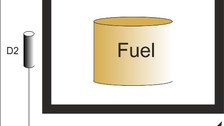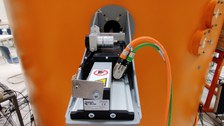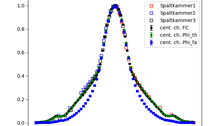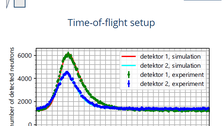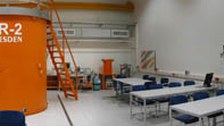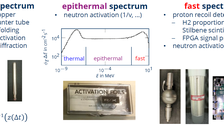AKR-2 / Reaktorphysik
Inhaltsverzeichnis
Kontakt
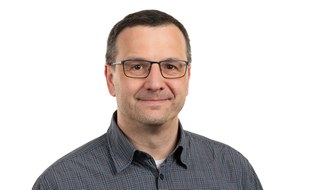
Research Associate
NameHerr Dr. rer. nat. Dipl.-Phys. Daniel Gehre
Nuclear training reactor AKR-2
Eine verschlüsselte E-Mail über das SecureMail-Portal versenden (nur für TUD-externe Personen).
Institut für Verfahrenstechnik und Umwelttechnik - Professur für Wasserstoff- und Kernenergietechnik
Institut für Verfahrenstechnik und Umwelttechnik - Professur für Wasserstoff- und Kernenergietechnik
Besuchsadresse:
Walter-Pauer-Bau, PAU 214/2 George-Bähr-Str. 3b
01069 Dresden
Homepage von Dr. rer. nat. Dipl.-Phys. Daniel Gehre
 © Sven Ellger/TUD
© Sven Ellger/TUD
Wissenschaftlicher Mitarbeiter
NameHerr Juan José Gómez Rodriguez M. Sc.
Eine verschlüsselte E-Mail über das SecureMail-Portal versenden (nur für TUD-externe Personen).
Institut für Verfahrenstechnik und Umwelttechnik - Professur für Wasserstoff- und Kernenergietechnik
Institut für Verfahrenstechnik und Umwelttechnik - Professur für Wasserstoff- und Kernenergietechnik
Besucheradresse:
Görges-Bau, GÖR/315 Helmholtzstr. 9
01069 Dresden
Deutschland
Homepage von Gómez Rodriguez, M. Sc.
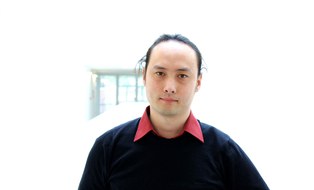 © Tina Mäntler
© Tina Mäntler
Wissenschaftlicher Mitarbeiter
NameHerr Dipl.-Phys. Alexander Knospe
Eine verschlüsselte E-Mail über das SecureMail-Portal versenden (nur für TUD-externe Personen).
Institut für Verfahrenstechnik und Umwelttechnik - Professur für Wasserstoff- und Kernenergietechnik
Institut für Verfahrenstechnik und Umwelttechnik - Professur für Wasserstoff- und Kernenergietechnik
Besucheradresse:
Görges-Bau, GÖR/313 Helmholtzstr. 9
01069 Dresden
Deutschland
Homepage von Dipl.-Phys. Alexander Knospe
Leiter des Ausbildungskernreaktors AKR-2
NameHerr Dr.-Ing. und Dipl.-Phys. Carsten Lange
Eine verschlüsselte E-Mail über das SecureMail-Portal versenden (nur für TUD-externe Personen).
Institut für Verfahrenstechnik und Umwelttechnik - Professur für Wasserstoff- und Kernenergietechnik
Institut für Verfahrenstechnik und Umwelttechnik - Professur für Wasserstoff- und Kernenergietechnik
Besuchsadresse:
Walther-Pauer-Bau, PAU 214/2 George-Bähr-Straße 3b
01069 Dresden
Homepage von Dr.-Ing. und Dipl.-Phys. Carsten Lange
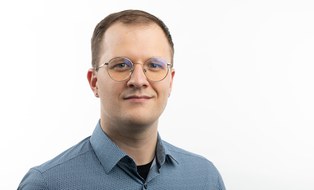 © Sven Ellger/TUD
© Sven Ellger/TUD
Wissenschaftlicher Mitarbeiter
NameHerr Vincent Melzer M. Sc.
Eine verschlüsselte E-Mail über das SecureMail-Portal versenden (nur für TUD-externe Personen).
Besucheradresse:
Görges-Bau, GÖR/315 Helmholtzstr. 9
01069 Dresden
Deutschland
Homepage von Vincent Melzer, M. Sc.
Wissenschaftlicher Mitarbeiter
NameFrau Elisa Naumann M. Sc.
Eine verschlüsselte E-Mail über das SecureMail-Portal versenden (nur für TUD-externe Personen).
Institut für Verfahrenstechnik und Umwelttechnik - Professur für Wasserstoff- und Kernenergietechnik
Institut für Verfahrenstechnik und Umwelttechnik - Professur für Wasserstoff- und Kernenergietechnik
Besucheradresse:
Görges-Bau, GÖR/314 Helmholtzstr. 9
01069 Dresden
Deutschland
Homepage von Elisa Naumann
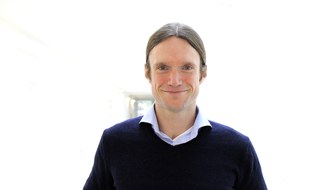 © Tina Mäntler
© Tina Mäntler
Wissenschaftlicher Mitarbeiter
NameHerr Dr.-Ing. Dipl.-Phys. Marco Viebach
Eine verschlüsselte E-Mail über das SecureMail-Portal versenden (nur für TUD-externe Personen).
Institut für Verfahrenstechnik und Umwelttechnik - Professur für Wasserstoff- und Kernenergietechnik
Institut für Verfahrenstechnik und Umwelttechnik - Professur für Wasserstoff- und Kernenergietechnik
Besucheradresse:
Görges-Bau, GÖR/315 Helmholtzstr. 9
01069 Dresden
Deutschland
Homepage von Dr.-Ing. Dipl.-Phys. Marco Viebach
Wissenschaftlicher Mitarbeiter
NameHerr Dipl.-Inf. Sascha Weichel
Eine verschlüsselte E-Mail über das SecureMail-Portal versenden (nur für TUD-externe Personen).
Besucheradresse:
Görges-Bau, GÖR/315 Helmholtzstr. 9
01069 Dresden
Deutschland
Homepage von Dipl.-Inf. Sascha Weichel
Die Forschung und Lehre des Lehr- und Forschungsgebietes der Reaktorphysik befasst sich mit grundlegenden reaktorphysikalischen Berechnungs- und Messmethoden im Kontext der Gewährleistung und Bewertung der Sicherheit bestehender und neuartiger Kernreaktoren. Im Zuge dieser Arbeiten wird der Ausbildungskernreaktor AKR-2 als Arbeitsplattform zur Validierung von Berechnungsmethoden und zur Entwicklung messtechnischer Verfahren eingesetzt und weiterentwickelt. Die Forschungs- und Entwicklungsarbeiten leisten einen Beitrag zur Verbesserung der sicherheitstechnischen Eigenschaften von Kernreaktoren, zur Entwicklung von Methoden zur Minimierung hochradioaktiver Abfälle und zur Proliferationssicherheit.
Im Zuge dieser Fragestellungen wird auf folgende Themen fokusiert:
- Stabilitätsanalyse von bestehenden und zukünftigen Kernreaktoren (wie zum Beispiel zum Salzschmelzereaktor oder zum Dual Fluid Reaktor)
- Beiträge zur Entwicklung von Kernüberwachungssystemen und Anwendung von rauschdiagnostischen Verfahren auf experimentell bestimmte und simulierte Größen, die den Zustand des Reaktors beschreiben
- Entwicklung und Anwendung von Methoden für die Kernmaterialüberwachung zur Erhöhung der Proliferationssicherheit
- Untersuchungen von Neutronenflussschwankungsmustern
- Entwicklung experimenteller Methoden im Kontext der Entwicklung neuer Kernreaktorsysteme, die eine Weiterbehandlung hochradioaktiver Abfälle ermöglichen
- Anwendung moderner mathematischer Methoden im Rahmen von Untersuchungen zu den sicherheitstechnischen Eigenschaften von Reaktorsystemen; beispielsweise kommen im Rahmen von Stabilitätsuntersuchungen Modellordnungsreduktionsmethoden und Methoden der nichtlinearen Dynamik, wie die Bifurkationsanalyse, zum Einsatz
- Aufbau einer Benchmarkplattform am AKR-2 zur Validierung reaktorphysikalischer Programmwerkzeuge und für die Vorbereitung eines größeren Einsatzbereiches des AKR-2 in Forschung und Lehre
Nachwuchsforschungsgruppe NAUTILUS
Die Nachwuchsforschungsgruppe NAUTILUS beschäftigt sich mit dem Querschnittsthema Weiterbehandlung hochradioaktiver Abfälle und Reaktorsicherheit und hat zum Ziel entsprechende experimentelle Methoden am Ausbildungskernreaktor AKR-2 zu entwickeln.
Neutronenradiographie
Die Neutronenradiographie ermöglicht eine zerstörungsfreie, qualitative und quantitative Bildgebung mittels Neutronen.
Weitere Information finden Sie hier.
Studienarbeiten
Aktuelle Aufgabenstellungen der Professur für Wasserstoff- und Kernenergietechnik finden Sie hier.
Projekte
Publikationen
2026
-
Monte Carlo modelling of the AKR-2 training and research reactor, 17 Feb. 2026, in: Annals of nuclear energy. 231, 112217Elektronische (Volltext-)VersionPublikation: Beitrag in Fachzeitschrift > Forschungsartikel
-
A Catalogue of Requirements for the Monitoring of Intakes of Radionuclides in Radiological Emergencies, Feb. 2026, in: Health physics : the radiation safety journal. 130, 2, S. 202-207, 6 S.Elektronische (Volltext-)VersionPublikation: Beitrag in Fachzeitschrift > Forschungsartikel
2025
-
The revised German guideline on the monitoring for intakes of radionuclides, 18 Dez. 2025, in: Radiation and environmental biophysicsElektronische (Volltext-)VersionPublikation: Beitrag in Fachzeitschrift > Übersichtsartikel (Review)
-
Reactivity induced transients with JEFF3.3 and JEFF4.0 at a zero-power reactor with Serpent, 20 Nov. 2025Elektronische (Volltext-)VersionPublikation: Beitrag zu Konferenzen > Wissenschaftliche Vortragsfolien
-
A Novel Measurement Setup for the Data Acquisition and Evaluation for Hydrogen-Filled Proportional Detectors and Stilbene Scintillation Detectors, 6 Nov. 2025, ANIMMA 2025 – Advancements in Nuclear Instrumentation Measurement Methods and their Applications . EDP Sciences - Web of Conferences, Band 338. 8 S., 10013Elektronische (Volltext-)VersionPublikation: Beitrag in Buch/Konferenzbericht/Sammelband/Gutachten > Beitrag in Konferenzband
-
Application of Unfolding Methods on Thermal Neutron Data Measured with a Single-Chopper Time-of-Flight Setup, 6 Nov. 2025, ANIMMA 2025 – Advancements in Nuclear Instrumentation Measurement Methods and their Applications . EDP Sciences - Web of Conferences, Band 338. 7 S., 04031Elektronische (Volltext-)VersionPublikation: Beitrag in Buch/Konferenzbericht/Sammelband/Gutachten > Beitrag in Konferenzband
-
Development of the pile oscillation method for the determination of integral cross section data at the AKR-2 training and research reactor, 6 Nov. 2025, ANIMMA 2025 – Advancements in Nuclear Instrumentation Measurement Methods and their Applications. EDP Sciences - Web of Conferences, Band 338. 5 S., 04030Elektronische (Volltext-)VersionPublikation: Beitrag in Buch/Konferenzbericht/Sammelband/Gutachten > Beitrag in Konferenzband
-
Neutron transmission experiment with PTFE at AKR-2, 16 Juli 2025, in: Annals of nuclear energy. 224, 111741Elektronische (Volltext-)VersionPublikation: Beitrag in Fachzeitschrift > Forschungsartikel
-
The Euratom NPHyCo project: Conceptualization, technical work plan and current status, Juli 2025, in: Progress in Nuclear Energy. 185, 105731Elektronische (Volltext-)VersionPublikation: Beitrag in Fachzeitschrift > Forschungsartikel
-
Measurement of the neutron and gamma spectra at the training and research reactor AKR-2, Mai 2025, in: Annals of Nuclear Energy. 214, 111194Elektronische (Volltext-)VersionPublikation: Beitrag in Fachzeitschrift > Forschungsartikel
Kooperationspartner des Forschungsbereiches "AKR-2" und "Reaktorphysik"
Forschungszentrum Jülich GmbH, Das Jülicher Zentrum für Forschung mit Neutronen (JCNS), 52425 JÜLICH
JCNS
Framatome GmbH
Framatome GmbH
Gesellschaft für Anlagen- und Reaktorsicherheit (GRS) gGmbH, Schwertnergasse 1, 50667 Köln
GRS
Paul-Scherrer Institut, Neutron Optics and Scientific Computing Group, at Laboratory for Scientific Developments and Novel Materials , CH-5232 Villigen, Switzerland
PSI
Czech International Centre of Research Reactors
Czech International Centre of Research Reactors
Faculty of Informatics, Masaryk University
Masaryk University, Faculty of Informatics
Helmholtz-Zentrum Dresden-Rossendorf
HZDR – Helmholtz-Zentrum Dresden-Rossendorf
VKTA – Strahlenschutz, Analytik & Entsorgung Rossendorf e. V.
VKTA
University of Liverpool
University of Liverpool
Bildergalerie

© bananacut_neutrons_2sigma_day1_KH475.png

© DeepCore-photo.png

© Pile-Oscilator-at-akr-

© pile-oscillator-photo
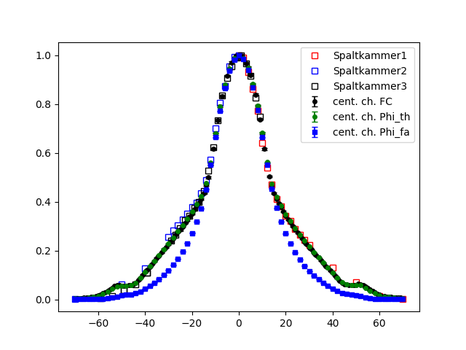
© radFlux.png
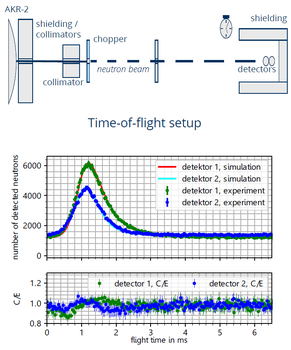
© time-of-flight-at-akr-2.png

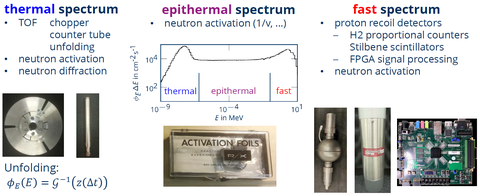
© spectrum-determination-akr-2.png








